�
Advanced Topics in Types and Programming Languages
�
Advanced Topics in
Types and Programming Languages
Benjamin C. Pierce, editor
The MIT Press
Cambridge, Massachusetts
London, England
�
©2005 Massachusetts Institute of Technology
All rights reserved. No part of this book may be reproduced in any form by
any electronic of mechanical means (including photocopying, recording, or
information storage and retrieval) without permission in writing from the
publisher.
This book was set in Lucida Bright by the editor and authors using the LATEX
document preparation system.
Printed and bound in the United States of America.
Library of Congress Cataloging-in-Publication Data
Advanced topics in types and programming languages / Benjamin C. Pierce,
editor.
p. cm.
Includes bibliographical references and index.
ISBN 0-262-16228-8 (hc.: alk. paper)
1. Programming languages (Electronic computers). I. Pierce, Benjamin C.
QA76.7.A36 2005
005.13—dc22
200457123
10 9 8 7 6 5 4 3 2 1
�
Contents
Preface
ix
I Precise Type Analyses
1
1
Substructural Type Systems
3
David Walker
1.1
1.2
1.3
1.4
1.5
1.6
4
Structural Properties
6
A Linear Type System
Extensions and Variations
An Ordered Type System
Further Applications
Notes
40
36
17
30
2 Dependent Types
45
David Aspinall and Martin Hofmann
2.1
2.2
2.3
2.4
2.5
2.6
2.7
2.8
2.9
2.10
54
45
Motivations
Pure FirstOrder Dependent Types
Properties
Algorithmic Typing and Equality
Dependent Sum Types
The Calculus of Constructions
Relating Abstractions: Pure Type Systems
Programming with Dependent Types
Implementation of Dependent Types
Further Reading
56
86
50
61
64
71
74
83
�
vi
Contents
3
Effect Types and RegionBased Memory Management
87
Fritz Henglein, Henning Makholm, and Henning Niss
3.1
3.2
3.3
3.4
3.5
3.6
3.7
3.8
90
102
Introduction and Overview
87
Value Flow by Typing with Labels
Effects
RegionBased Memory Management
The Tofte–Talpin Type System
Region Inference
More Powerful Models for RegionBased Memory
Management
Practical RegionBased Memory Management Systems
106
114
127
123
133
II Types for LowLevel Languages
137
4 Typed Assembly Language
141
Greg Morrisett
4.1
4.2
4.3
4.4
4.5
4.6
4.7
4.8
146
142
TAL0: ControlFlowSafety
The TAL0 Type System
TAL1: Simple MemorySafety
TAL1 Changes to the Type System
Compiling to TAL1
Scaling to Other Language Features
Some Real World Issues
Conclusions
164
172
175
155
161
167
5
ProofCarrying Code
177
George Necula
5.1
5.2
5.3
5.4
5.5
5.6
5.7
5.8
182
177
Overview of Proof Carrying Code
Formalizing the Safety Policy
VerificationCondition Generation
Soundness Proof
The Representation and Checking of Proofs
Proof Generation
PCC beyond Types
Conclusion
219
187
199
214
216
204
�
Contents
vii
III Types and Reasoning about Programs
221
6
Logical Relations and a Case Study in Equivalence Checking
223
Karl Crary
227
224
The Equivalence Problem
NonTypeDirected Equivalence Checking
TypeDriven Equivalence
An Equivalence Algorithm
Completeness: A First Attempt
Logical Relations
A Monotone Logical Relation
The Main Lemma
The Fundamental Theorem
6.1
6.2
6.3
6.4
6.5
6.6
6.7
6.8
6.9
6.10 Notes
228
232
233
237
236
239
243
7 Typed Operational Reasoning
245
Andrew Pitts
7.1
7.2
7.3
7.4
7.5
7.6
7.7
7.8
247
246
245
Introduction
Overview
Motivating Examples
The Language
253
Contextual Equivalence
An Operationally Based Logical Relation
Operational Extensionality
Notes
261
279
288
225
266
IV Types for Programming in the Large
291
8 Design Considerations for MLStyle Module Systems
293
Robert Harper and Benjamin C. Pierce
298
302
294
Basic Modularity
Type Checking and Evaluation of Modules
Compilation and Linking
Phase Distinction
305
Abstract Type Components
Module Hierarchies
317
Signature Families
Module Families
Advanced Topics
8.1
8.2
8.3
8.4
8.5
8.6
8.7
8.8
8.9
8.10 Relation to Some Existing Languages
8.11 History and Further Reading
343
324
338
307
320
341
�
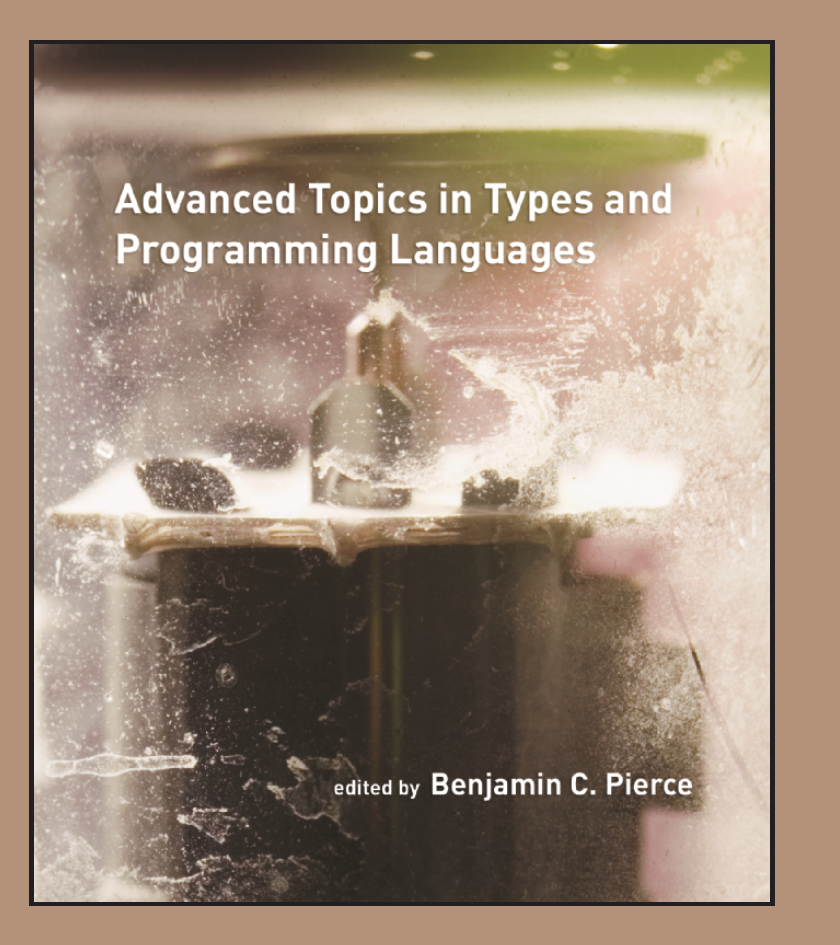


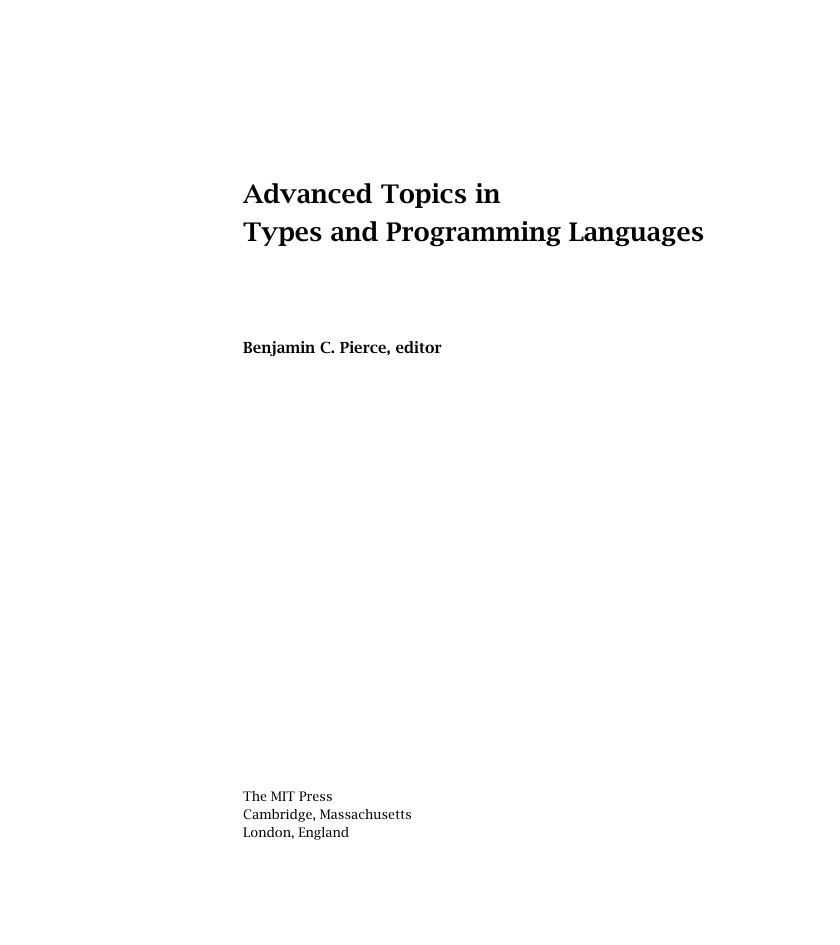
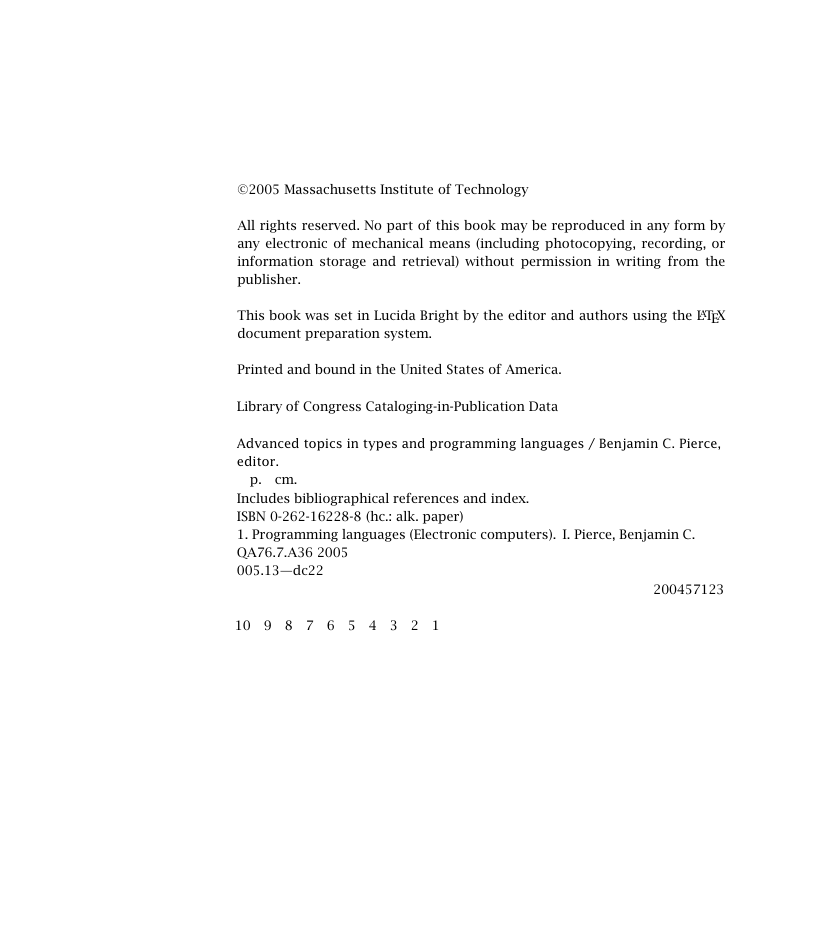
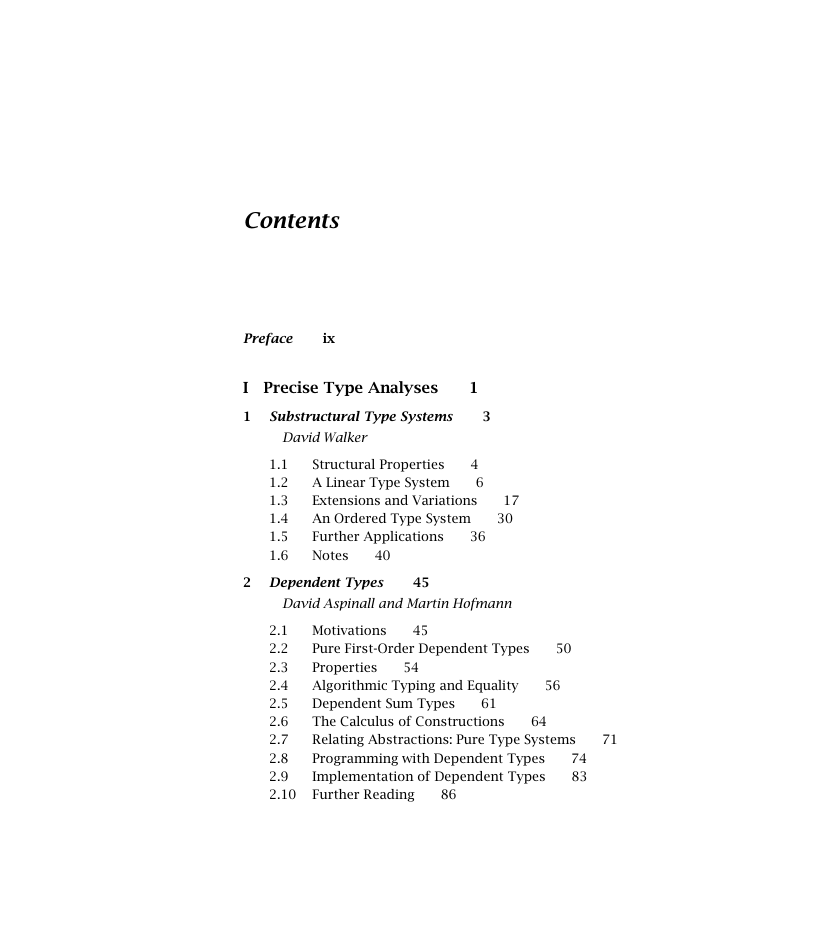
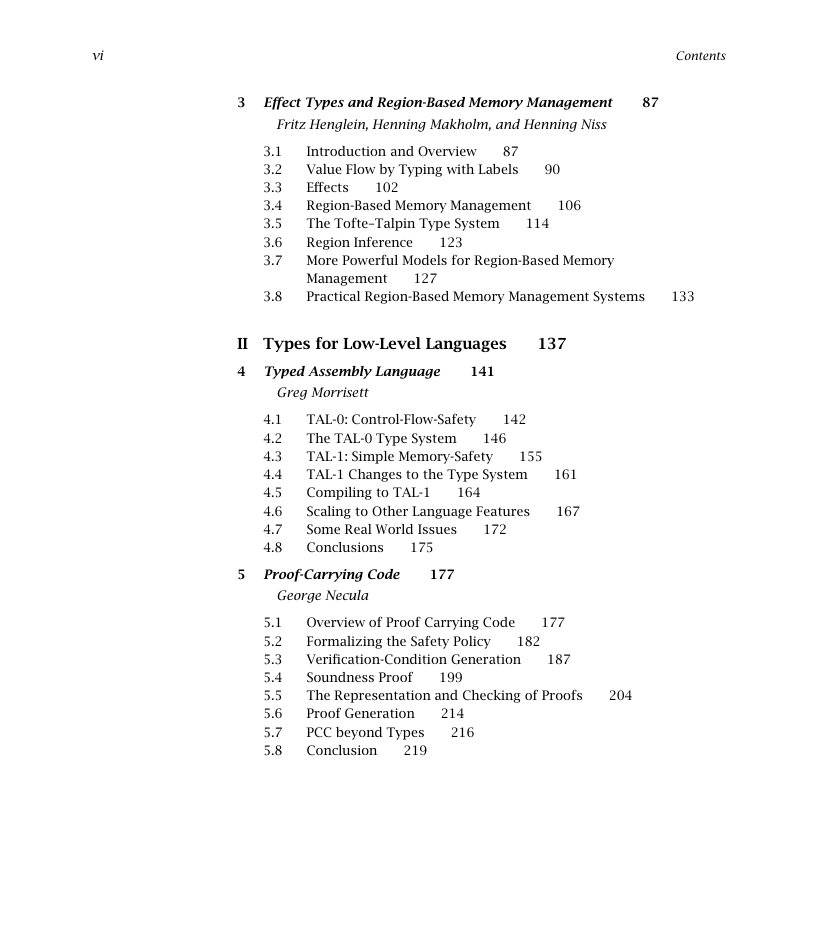









 2023年江西萍乡中考道德与法治真题及答案.doc
2023年江西萍乡中考道德与法治真题及答案.doc 2012年重庆南川中考生物真题及答案.doc
2012年重庆南川中考生物真题及答案.doc 2013年江西师范大学地理学综合及文艺理论基础考研真题.doc
2013年江西师范大学地理学综合及文艺理论基础考研真题.doc 2020年四川甘孜小升初语文真题及答案I卷.doc
2020年四川甘孜小升初语文真题及答案I卷.doc 2020年注册岩土工程师专业基础考试真题及答案.doc
2020年注册岩土工程师专业基础考试真题及答案.doc 2023-2024学年福建省厦门市九年级上学期数学月考试题及答案.doc
2023-2024学年福建省厦门市九年级上学期数学月考试题及答案.doc 2021-2022学年辽宁省沈阳市大东区九年级上学期语文期末试题及答案.doc
2021-2022学年辽宁省沈阳市大东区九年级上学期语文期末试题及答案.doc 2022-2023学年北京东城区初三第一学期物理期末试卷及答案.doc
2022-2023学年北京东城区初三第一学期物理期末试卷及答案.doc 2018上半年江西教师资格初中地理学科知识与教学能力真题及答案.doc
2018上半年江西教师资格初中地理学科知识与教学能力真题及答案.doc 2012年河北国家公务员申论考试真题及答案-省级.doc
2012年河北国家公务员申论考试真题及答案-省级.doc 2020-2021学年江苏省扬州市江都区邵樊片九年级上学期数学第一次质量检测试题及答案.doc
2020-2021学年江苏省扬州市江都区邵樊片九年级上学期数学第一次质量检测试题及答案.doc 2022下半年黑龙江教师资格证中学综合素质真题及答案.doc
2022下半年黑龙江教师资格证中学综合素质真题及答案.doc